 January 2012 in “Yearbook of Dermatology and Dermatologic Surgery”
January 2012 in “Yearbook of Dermatology and Dermatologic Surgery” Studying acne-related syndromes helps us understand acne causes and can lead to new treatments.
 94 citations,
October 2017 in “International Journal of Dermatology”
94 citations,
October 2017 in “International Journal of Dermatology” Lichen planus pigmentosus causes dark skin patches and is treated by avoiding triggers and using anti-inflammatory medications.
58 citations,
January 2010 in “Arthritis Care & Research” Hydroxychloroquine may help delay skin damage in lupus patients.
March 2022 in “JAAD case reports” Accurate diagnosis is crucial for effective treatment of hair loss.
 April 2019 in “Journal of emerging technologies and innovative research”
April 2019 in “Journal of emerging technologies and innovative research” Early treatment of Female Pattern Hair Loss is important to stop it from getting worse, and various treatments can help, especially in mild to moderate cases.
 May 2024 in “Clinical Cosmetic and Investigational Dermatology”
May 2024 in “Clinical Cosmetic and Investigational Dermatology” Manipulating cell cleanup processes could help treat hair loss.
10 citations,
January 2019 in “Indian Journal of Dermatology” Early-onset male hair loss is linked to metabolic syndrome, suggesting a need for heart health monitoring and lifestyle changes.
 January 2021 in “The Ochsner journal”
January 2021 in “The Ochsner journal” ADHD stimulant medications might be linked to a specific type of hair loss called Alopecia Universalis.
 10 citations,
February 2015 in “Clinics in Dermatology”
10 citations,
February 2015 in “Clinics in Dermatology” The document concludes that changes in eyelashes and eyelid skin can indicate various local and systemic diseases.
 September 2022 in “Skin appendage disorders”
September 2022 in “Skin appendage disorders” Seborrheic dermatitis may contribute to the development of central centrifugal cicatricial alopecia.
 3 citations,
July 2023 in “Nature Communications”
3 citations,
July 2023 in “Nature Communications” The ShorT method can detect and help reduce bias in medical AI by identifying shortcut learning.
 19 citations,
January 2016 in “Dermatology Research and Practice”
19 citations,
January 2016 in “Dermatology Research and Practice” The study concluded that hair loss in Indian women is not significantly linked to anemia or thyroid problems, but checking thyroid function could help those with ongoing hair loss.
 3 citations,
March 2007 in “Otolaryngologic Clinics of North America”
3 citations,
March 2007 in “Otolaryngologic Clinics of North America” Choosing the right eyebrow and forehead rejuvenation technique depends on the individual's features and goals, and even small changes can make a big difference in appearance.
 12 citations,
September 2018 in “Journal of Drug Delivery Science and Technology”
12 citations,
September 2018 in “Journal of Drug Delivery Science and Technology” The silk fibroin hydrogel with FGF-2-liposome can potentially treat hair loss in mice.
 November 2023 in “Materials Today Bio”
November 2023 in “Materials Today Bio” Light therapy might help treat hereditary hair loss by improving hair follicle growth in lab cultures.
7 citations,
July 2013 in “Egyptian Journal of Dermatology and Venereology”  1 citations,
October 2022 in “JCI insight”
1 citations,
October 2022 in “JCI insight” Deleting the BRD4 protein in certain skin cells causes hair loss and skin inflammation.
 December 2023 in “Benha Journal of Applied Sciences”
December 2023 in “Benha Journal of Applied Sciences” AGEs and their receptors play a significant role in hair loss by causing inflammation and oxidative stress.
 48 citations,
January 2000 in “Hormone Research in Paediatrics”
48 citations,
January 2000 in “Hormone Research in Paediatrics” Cytokines and neuropeptides are key in controlling androgen levels, affecting skin and hair conditions.
 August 2024 in “International Journal of Health Science”
August 2024 in “International Journal of Health Science” Telogen Effluvium (TE) significantly affects women due to stress and hormonal changes, requiring better public health policies and mental health support.
 222 citations,
January 2014 in “International journal of reproductive medicine”
222 citations,
January 2014 in “International journal of reproductive medicine” Insulin resistance and obesity are key factors in the development and worsening of polycystic ovary syndrome, and lifestyle changes are important for managing it.
 138 citations,
March 2001 in “Clinics in Dermatology”
138 citations,
March 2001 in “Clinics in Dermatology” Hair loss can significantly affect a person's self-esteem and body image, especially in young people, those who value their looks highly, and women.
 8 citations,
May 2022 in “Journal of medicine and life”
8 citations,
May 2022 in “Journal of medicine and life” COVID-19 patients may experience hair loss, but it's not linked to their age or sex.
 July 2018 in “Elsevier eBooks”
July 2018 in “Elsevier eBooks” The most common cause of hair loss in children is tinea capitis, followed by alopecia areata and telogen effluvium.
 42 citations,
January 2008 in “Dermatology”
42 citations,
January 2008 in “Dermatology” Dermoscopy effectively distinguishes between acute total hair loss and other types of female hair loss.
 1 citations,
February 2023 in “Journal of the American Board of Family Medicine”
1 citations,
February 2023 in “Journal of the American Board of Family Medicine” Primary care should recognize and treat hair loss in hijab-wearing individuals with cultural sensitivity.
 8 citations,
March 2019 in “Progress in Human Geography”
8 citations,
March 2019 in “Progress in Human Geography” Hair significantly shapes body identity and social interactions, influencing how we perceive and relate to our bodies.
 June 2023 in “Research Square (Research Square)”
June 2023 in “Research Square (Research Square)” Different immune responses cause hair loss in scalp diseases, with unique patterns in scalp psoriasis possibly protecting against hair loss.
 1 citations,
January 2023 in “Life sciences”
1 citations,
January 2023 in “Life sciences” GABA contributes to stress-related hair loss, and ginkgolide A may help treat it.
 February 2023 in “Sibirskij onkologičeskij žurnal”
February 2023 in “Sibirskij onkologičeskij žurnal” Chemotherapy often causes hair loss in cancer patients, affecting their mental health, but scalp cooling can help prevent it.


























